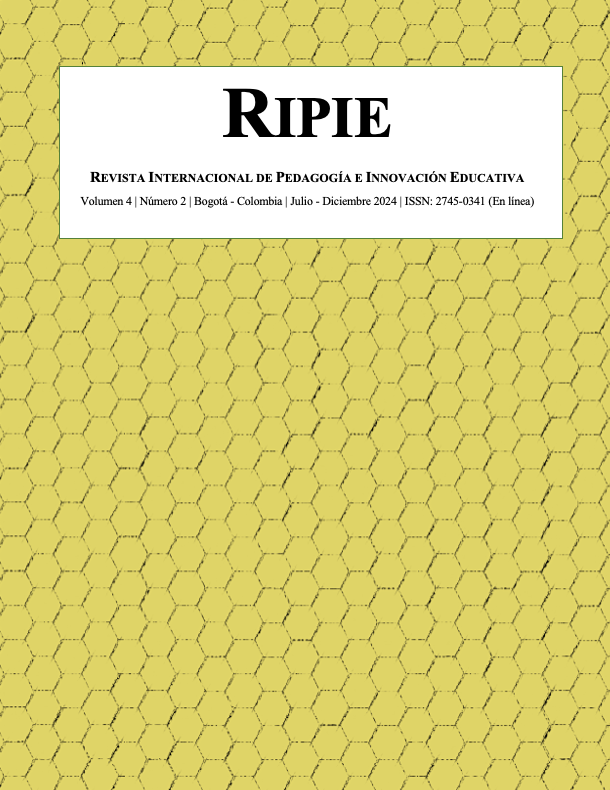Innovación educativa con sistemas de aprendizaje adaptativo impulsados por Inteligencia Artificial
DOI:
https://doi.org/10.51660/ripie42222Palabras clave:
innovación educativa, aprendizaje adaptativo, inteligencia artificial, personalización, tecnología educativaResumen
La irrupción de la Inteligencia Artificial (IA) está transformando la educación mediante sistemas de aprendizaje adaptativo. Estos sistemas, basados en algoritmos de IA, personalizan la experiencia educativa ajustándose a las necesidades y estilos de aprendizaje de cada estudiante. Utilizando técnicas como el machine learning y el deep learning, analizan grandes volúmenes de datos para generar itinerarios de aprendizaje personalizados, rompiendo con el modelo de enseñanza homogénea. Para su implementación, se requiere una plataforma tecnológica adecuada, una infraestructura de datos sólida y la formación de docentes en el uso de estas herramientas. Los beneficios son múltiples: los estudiantes reciben retroalimentación en tiempo real y avanzan a su propio ritmo, mejorando su motivación y eficacia en el aprendizaje, mientras los docentes pueden enfocar sus esfuerzos en tareas de mayor valor añadido y obtener información valiosa sobre el progreso de sus estudiantes, facilitando la enseñanza adaptativa y personalizada.
Descargas
Referencias
Alfredo, R., Echeverria, V., Jin, Y., Yan, L., Swiecki, Z., Gašević, D., & Martinez-Maldonado, R. (2024). Human-centred learning analytics and AI in education: A systematic literature review. Computers and Education: Artificial Intelligence, 6. https://doi.org/10.1016/j.caeai.2024.100215
Alrawashdeh, G. S., Fyffe, S., Azevedo, R. F. L., & Castillo, N. M. (2024). Exploring the impact of personalized and adaptive learning technologies on reading literacy: A global meta-analysis. Educational Research Review, 42. https://doi.org/10.1016/j.edurev.2023.100587
Amini, H., Alanne, K., & Kosonen, R. (2024). Building simulation in adaptive training of machine learning models. Automation in Construction, 165. https://doi.org/10.1016/j.autcon.2024.105564
Aparicio Gómez, O. Y., Ostos Ortiz, O. L., & Mesa Angulo, J. G. (2022). La convergencia de aprendizajes en el metaverso. Revista Interamericana de Investigación Educación y Pedagogía RIIEP, 15(2), 385–398. https://doi.org/10.15332/25005421.7879
Aparicio-Gómez, O.-Y., & Aparicio-Gómez, W.-O. (2021). Referentes filosóficos del proceso educativo. Revista Internacional de Filosofía Teórica y Práctica, 1(2), 157–168. https://doi.org/10.51660/riftp.v1i2.37
Costa, A., Silva, F., & Moreira, J. J. (2024). Towards an AI-Driven User Interface Design for Web Applications. Procedia Computer Science, 237, 179–186. https://doi.org/10.1016/j.procs.2024.05.094
Han, J., Liu, G., Liu, X., Yang, Y., Quan, W., & Chen, Y. (2024). Continue using or gathering dust? A mixed method research on the factors influencing the continuous use intention for an AI-powered adaptive learning system for rural middle school students. Heliyon, 10(12). https://doi.org/10.1016/j.heliyon.2024.e33251
Ipinnaiye, O., & Risquez, A. (2024). Exploring adaptive learning, learner-content interaction and student performance in undergraduate economics classes. Computers and Education, 215. https://doi.org/10.1016/j.compedu.2024.105047
Kang, G., Seong, H., Lee, D., & Shim, D. H. (2024). A versatile door opening system with mobile manipulator through adaptive position-force control and reinforcement learning. Robotics and Autonomous Systems, 104760. https://doi.org/10.1016/j.robot.2024.104760
Khan, A. E., Hasan, M. J., Anjum, H., Mohammed, N., & Momen, S. (2024). Predicting life satisfaction using machine learning and explainable AI. Heliyon, 10(10). https://doi.org/10.1016/j.heliyon.2024.e31158
Mwambe, O. O. (2024). Deployment of information processing theory to support adaptive e-learning systems: Feasibility study. Computers in Human Behavior Reports, 14. https://doi.org/10.1016/j.chbr.2024.100420
Naseer, F., Khan, M. N., Tahir, M., Addas, A., & Aejaz, S. M. H. (2024). Integrating deep learning techniques for personalized learning pathways in higher education. Heliyon, 10(11). https://doi.org/10.1016/j.heliyon.2024.e32628
Ouyang, F., & Zhang, L. (2024). AI-driven learning analytics applications and tools in computer-supported collaborative learning: A systematic review. Educational Research Review, 44. https://doi.org/10.1016/j.edurev.2024.100616
Pahi, K., Hawlader, S., Hicks, E., Zaman, A., & Phan, V. (2024). Enhancing active learning through collaboration between human teachers and generative AI. Computers and Education Open, 6, 100183. https://doi.org/10.1016/j.caeo.2024.100183
Pan, S., Hafez, B., Iskandar, A., & Ming, Z. (2024). Integrating constructivist principles in an adaptive hybrid learning system for developing social entrepreneurship education among college students. Learning and Motivation, 87, 102023. https://doi.org/10.1016/J.LMOT.2024.102023
Sharma, A., & Singh, U. K. (2022a). Modelling of smart risk assessment approach for cloud computing environment using AI & supervised machine learning algorithms. Global Transitions Proceedings, 3(1), 243–250. https://doi.org/10.1016/j.gltp.2022.03.030
Sharma, A., & Singh, U. K. (2022b). Modelling of smart risk assessment approach for cloud computing environment using AI & supervised machine learning algorithms. Global Transitions Proceedings, 3(1), 243–250. https://doi.org/10.1016/j.gltp.2022.03.030
Shoaib, M., Sayed, N., Singh, J., Shafi, J., Khan, S., & Ali, F. (2024). AI student success predictor: Enhancing personalized learning in campus management systems. Computers in Human Behavior, 158. https://doi.org/10.1016/j.chb.2024.108301
Song, Y., Weisberg, L. R., Zhang, S., Tian, X., Boyer, K. E., & Israel, M. (2024). A framework for inclusive AI learning design for diverse learners. Computers and Education: Artificial Intelligence, 6. https://doi.org/10.1016/j.caeai.2024.100212
Tebenkov, E., & Prokhorov, I. (2021). Machine learning algorithms for teaching AI chat bots. Procedia Computer Science, 190, 735–744. https://doi.org/10.1016/j.procs.2021.06.086
Teke, A., & Kavzoglu, T. (2024). Exploring the decision-making process of ensemble learning algorithms in landslide susceptibility mapping: Insights from local and global explainable AI analyses. Advances in Space Research. https://doi.org/10.1016/j.asr.2024.06.082
Variant Anna, N. E. (2024). AI/ Machine Learning for Cataloguing, Classification, and Indexing. Reference Module in Social Sciences. https://doi.org/10.1016/B978-0-323-95689-5.00131-0
Zheng, W. (2024). Intelligent e-learning design for art courses based on adaptive learning algorithms and artificial intelligence. Entertainment Computing, 50. https://doi.org/10.1016/j.entcom.2024.100713
Descargas
Publicado
Número
Sección
Licencia
Derechos de autor 2024 Revista Internacional de Pedagogía e Innovación Educativa

Esta obra está bajo una licencia internacional Creative Commons Atribución-NoComercial-CompartirIgual 4.0.
Los artículos se publican bajo los términos de una licencia que permite el uso, distribución y reproducción en cualquier medio, siempre que el trabajo original se cite correctamente. Ed&TIC conserva los derechos patrimoniales de las obras publicadas y promueve activamente la reutilización de las mismas bajo los términos de la licencia mencionada anteriormente, lo que fomenta la difusión del conocimiento y la colaboración en la comunidad académica.


